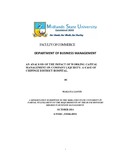Please use this identifier to cite or link to this item:
https://cris.library.msu.ac.zw//handle/11408/603| Title: | An analysis of the impact of working capital management on company liquidity: the case of Chipinge District Hospital | Authors: | Makaya, Lloyd | Keywords: | Working capital management | Issue Date: | 2014 | Publisher: | Midlands State University | Abstract: | Working capital management is vital and it has become the lifeblood of any organisation. This research study “Analysis of the impact of working capital management on company liquidity: The case of Chipinge District Hospital.” This research study sought to examine the implications of effective working capital management on organisation’s liquidity. The research sought to fulfill objectives such as assessing the influence of average collection period, average creditors’ payment period and the effects of cash conversion cycle on liquidity as well as making specific recommendations for improvement in liquidity. The research looked at, among other issues definition of working capital management, efficient working capital management, gross working capital and net working capital, permanent and temporary working capital, optimum working policy, impact of cash conversion cycle, debtors’ collection period and creditors payment period on liquidity. Beside these, other aspects covered include working capital financing, empirical literature on the impact of working capital management on liquidity and effective management of cash, inventory, account receivables and trade payables. In carrying out the research, the researcher used descriptive research design, both primary and secondary sources of data were used. A target population of 49 was used and a sample size of 25 was employed. The research make use of both probability and non-probability sampling methods. Probability techniques used was stratified random sampling. On non-probability sampling techniques, convenience and purposive sampling methods were employed. Self-completion questionnaires and interviews were used as the research instruments. From the information gathered during the research, it was noted that cash conversion cycle, debtors’ collection period, inventory conversion period and creditors’ payment period are significant indicators of working capital management. More so it has been revealed that the organisation had a longer average collection and payment period. Cash conversion cycle and debtors payment period have a strong negative relationship with liquidity. A strong positive relationship between creditors’ payment period and liquidity has been observed. Besides this, it has been noted that cash and inventory management techniques were fairly understood and used in the hospital. Basing on the findings of the research, it has been concluded that working capital management has an influence on liquidity, shorter creditors’ payment period reduces cash flow position of the organisation. Furthermore, longer average collection period reduces cash flows. Lack of proper cash flow forecasting leads to revenue and expenditure mismatch and causes cash crisis. From the research findings, the researcher recommended the organisation to set realistic cash flow forecasts and create a sound and defined credit policy and improve its collection procedures. Its operations requires to be computerised in order to enhance efficiency. Again, internal control systems needs to be reviewed periodically and develop modern internal control systems. and lastly but not the least an organisation –wide approach is required to enhance wholesome effective working capital management. | URI: | http://hdl.handle.net/11408/603 |
| Appears in Collections: | Bachelor Of Commerce Business Management Honours Degree |
Files in This Item:
| File | Description | Size | Format | |
|---|---|---|---|---|
| DISSERTATION CORRECTED FOR EXEC BINDING.pdf | 545.69 kB | Adobe PDF |  View/Open |
Page view(s)
138
checked on Dec 12, 2024
Download(s)
142
checked on Dec 12, 2024
Google ScholarTM
Check
Items in MSUIR are protected by copyright, with all rights reserved, unless otherwise indicated.



